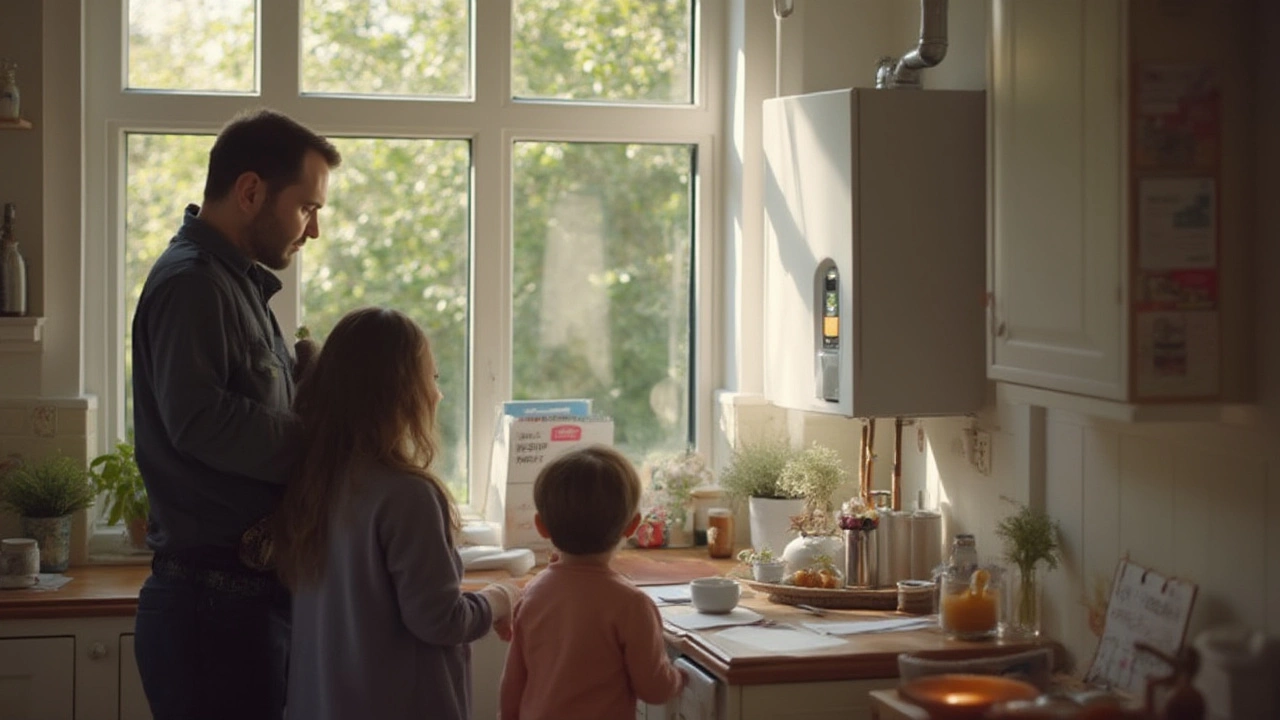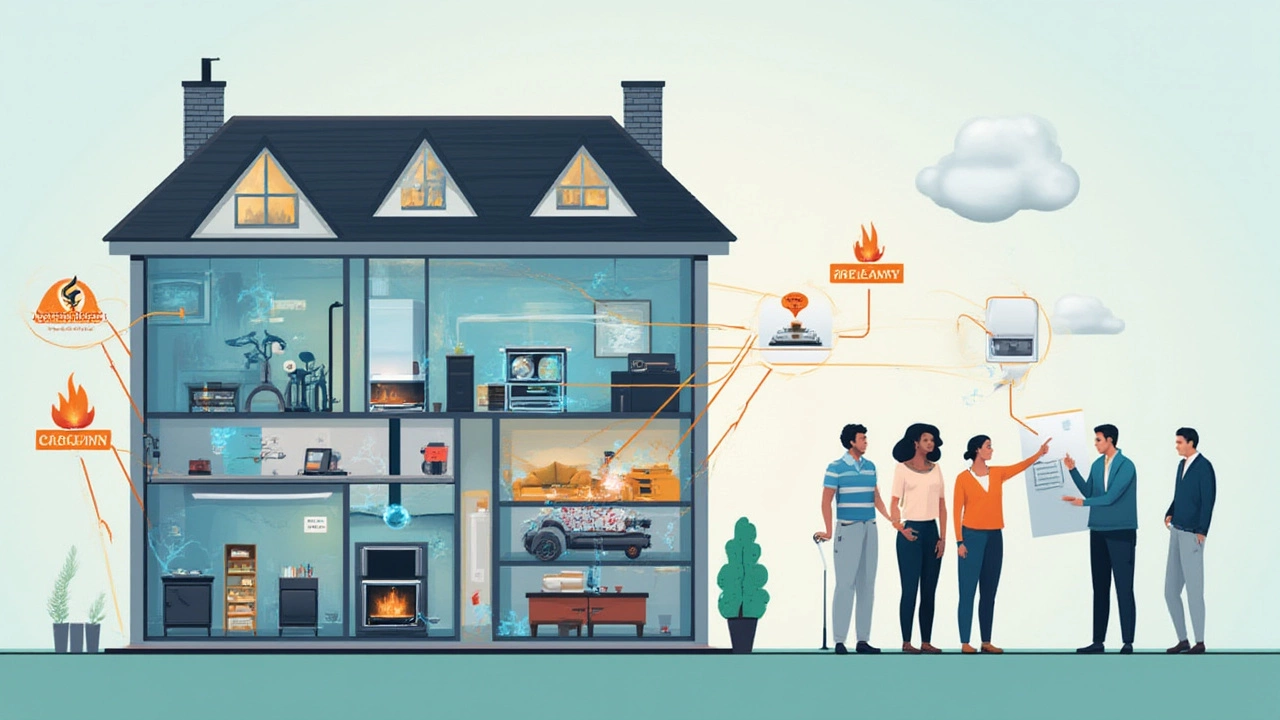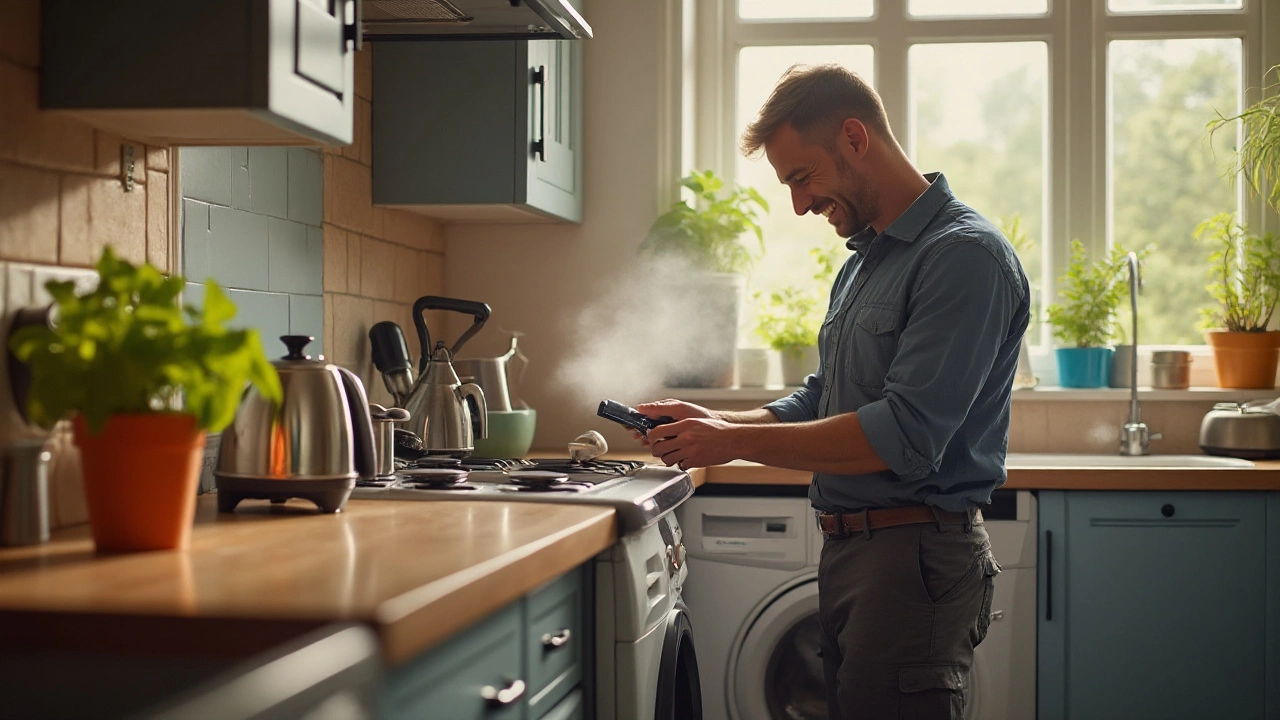
- 12 Jul 2025
- Gideon Thornton
- 0
There's no gentle way to put it—gas appliances can be ticking time bombs when you don’t give them proper attention. The stories are out there: an ordinary oven causing headaches, a boiler silently leaking carbon monoxide, a seemingly harmless stove emitting gas overnight. What do they have in common? Most of these accidents could have been stopped with a routine check.
Why Gas Appliance Inspections Matter More Than You Think
Every year, faulty gas appliances are behind thousands of hospital visits—and the real numbers might surprise you. Take the UK: the Gas Safe Register reports that about 60 accidental deaths and more than 200 non-fatal CO poisonings crop up yearly just from unsafe gas appliances. Now, multiply those risks across millions of homes, and you see why ignoring checks is a gamble.
Let’s talk science for a second. Gas-powered appliances—like boilers, stoves, water heaters, and ovens—use combustible fuel. If these don’t burn cleanly, you get by-products like carbon monoxide (CO), a gas invisible to every sense you have. CO exposure can cause nausea, dizziness, even death. But gas appliances can also leak natural gas: one spark from a faulty spark igniter, and you’re looking at a fire or explosion. Gas leaks on their own are scary—methane is highly flammable and cuts your oxygen if levels get high indoors.
One fact you don't want to forget: most gas leaks and carbon monoxide incidents happen because people think, “I’ll get it checked next year” or “It looks fine to me.” Too many folks get false peace of mind from a quiet, working appliance. The outer shell can look spotless, but internal valves and pipes wear out or corrode—especially after years of steam, moisture, and vibration.
Landlords in many countries, including the UK, face fines reaching £6,000 or even prison if a gas appliance hasn’t been checked at least every 12 months in properties they let out—that’s how seriously governments take it. Homeowners often fall outside these strict rules, but the risk doesn’t shrink just because the law’s not chasing you. And, if you think insurance will always cover accidents from a neglected boiler, think again: skipped inspections void a surprising number of claims.
So why do most people ignore this? Sometimes it’s about cost, but mostly, people hope for the best instead of planning for the worst. Truth is, catching a dodgy seal or a tiny crack in a heat exchanger is usually cheaper than replacing a ruined kitchen—or worse, dealing with health consequences you can’t undo.
How Often Should Gas Appliances Really Be Checked?
There are a lot of myths about when you should get gas appliances checked. Forget the old advice from your neighbor who only gets their gas inspected “when it smells funny.” Sticking to an evidence-backed schedule can literally save lives. Here’s what the experts and safety organizations actually say:
Gas appliance inspection should be an annual ritual. That means once every 12 months, not “around” every year, and not “when you remember.” Manufacturers, insurance providers, and gas safety authorities all recommend yearly servicing. For landlords, UK law makes it mandatory, but for private homeowners, it’s just as important—after all, carbon monoxide won’t skip your house just because you own it.
That being said, there are a few exceptions and extra rules:
- If you have a brand-new appliance, stick to the manufacturer’s first check-in date, usually after 12 months.
- Got an old boiler (15+ years)? Get it checked every year without fail—even twice a year if it’s showing its age or if it breaks down frequently.
- Spaces with higher use (like rental properties or kitchens in shared houses) might need closer attention. Highly used appliances can wear out much faster.
- If you smell gas, spot soot around burners, or your appliance struggles to light up, get it checked—immediately.
Some insurers or property managers require documentation. In the UK and EU, the Gas Safety Record (sometimes called a 'certificate') is the official paper trail confirming the inspection.
Here’s a table of general recommendations:
| Appliance Type | Recommended Check Frequency |
|---|---|
| Boiler (all types) | Every 12 months |
| Gas Stove / Oven | Every 12 months |
| Gas Water Heater | Every 12 months |
| Gas Fires | Every 12 months |
| Old or Commercial Appliances | Every 6-12 months |
If you move into a new place, always demand proof of a recent gas check. If you can’t see a record, play it safe and summon an engineer before switching anything on.

What Actually Happens During a Gas Appliance Check?
Ever wondered what these checks include? It’s not just someone glancing at a sticker and calling it a day. Qualified gas engineers (usually on the Gas Safe Register in the UK, or similarly accredited in other countries) use special tools to test for leaks, check pressure, and inspect the integrity of the appliance and vents.
Here’s a breakdown of what usually happens during a standard annual gas appliance check:
- The engineer inspects the exterior and interior of the appliance for visible signs of damage, corrosion, rust, soot, or cracks.
- They check all pipework and connections for leaks—using handheld detectors sensitive enough to sense a leak before it’s sniffable by humans.
- The appliance is switched on and run through its settings. Engineers watch flame pictures (the color and shape), listen for odd clicks or noises, and test the thermostat controls.
- Safety devices like cutoff valves, gas shutoff switches, and pilot lights get tested.
- They measure the gas pressure and airflow—making sure nothing’s blocked and no carbon monoxide or gas is getting back inside.
- Most will also check ventilation, ensuring flues and chimneys vent gases outside properly. Blockages from bird nests or soot are a lot more common than you’d guess.
- A carbon monoxide detector is often placed nearby during testing. Some engineers recommend you install a permanent one close to gas appliances as a backup.
- At the end, you’ll get a written or digital report—that’s proof for your records and insurance.
These checks aren’t long, usually about an hour for one or two appliances. Catching a slow leak or blocked vent can mean the difference between safe, cheap peace of mind and having to call emergency services at 2 AM.
If you’re handy, you can do quick visual checks now and then: look for scorch marks around burners, unusual odors, yellow (instead of blue) flames, or condensation on windows. But never skip the yearly pro check—it’s not worth the risk.
Smart Tips To Keep Gas Appliances Safe Between Checks
Annual checks are non-negotiable, but you can minimize danger even more by building a few habits into your routine. It doesn’t have to be a hassle. Here are actions every homeowner or tenant should consider:
- Install carbon monoxide alarms: Put them near bedrooms and every room with a gas appliance. Test alarms monthly and swap batteries every year.
- Keep vents clear: Don’t block grilles, vents, or air bricks. Never store boxes or laundry over heaters or boilers—it traps heat and blocks airflow.
- Never DIY gas repairs: Legally (and wisely), only certified gas engineers should open up gas appliances, even if it looks like a ‘simple fix’ online. The smallest mistake can lead to a disaster.
- Watch for warning signs: Soot around burners, hissing noises, pilot lights that keep going out, yellow or orange flames (instead of crisp blue)—all these scream “call an engineer.”
- Read the manual: Sounds boring, but your appliance’s manual will have specific servicing info and owner tasks you shouldn’t ignore. Sometimes there are built-in reminders or lights to alert you before a small fault becomes dangerous.
- Don’t ignore the smell of gas: If you catch a whiff, turn everything off, open doors and windows, leave the property, and call your gas emergency line (not your usual repair company) from outside.
- Log your services: Keep a folder, even a digital one, with all gas check receipts. Handy for insurance, moving house, or dealing with landlords and tenants.
- Check CO alarm expiry dates: Most alarms last 5–7 years. Out-of-date alarms don’t work. Replace them even if they look fine.
- Ask about safety when hiring a property: Renters should always see a Gas Safety Record and ask what the landlord does between checks.
People who follow these steps rarely run into trouble, and when they do, it’s caught early. Gas appliances have a long safe life when you treat them right—sometimes 15–20 years for a well-maintained boiler, or longer for a top-quality stove. But that lifespan drops fast when you skip checks, overload circuits, or ignore warning signs.
One final word: advances in ‘smart home’ tech haven’t replaced the need for human inspections. An app can warn you if something’s gone badly wrong, but it can’t spot the slow, silent decline inside an old appliance. If safety’s your goal, that yearly check is the smartest investment you’ll make all year.



